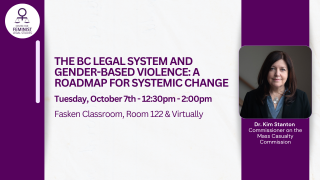Feminisms & Law 101 - Recording
Feminisms & Law 101 - Recording
Oct 1, 2020
On October 1, 2020, the Centre for Feminist Legal Studies (CFLS) hosted Feminisms & Law 101, which was an opportunity to hear from a number of Allard Law professors about how they bring diverse feminist lenses to their research across a range of subject areas – from the law of cities to corporate and commercial, criminal, employment, and Indigenous law and more! See below for an introduction from the CFLS Director, Debra Parkes.
Welcome to Feminisms and Law 101, presented by the Centre for Feminist Legal Studies at the Peter A. Allard School of Law, University of British Columbia. There are many downsides to the pandemic (and that is an understatement) but something it has prompted is the possibility of more virtual events like this – one that brings people from across Canada and even around the world – together to talk about feminisms and law!
Thank you all for coming today.
I’m Debra Parkes and I have the honour of holding the Chair in Feminist Legal Studies, here at UBC. I am also currently the Director of the Centre for Feminist Legal Studies. Twenty five years ago, I was a student at this law school. If you are a student, looking to find your place, I remember being in your shoes. Welcome to you and to everyone who is joining us today.
I want to begin by acknowledging that I am coming to you today from the traditional, ancestral, and unceded lands of the Coast Salish peoples, specifically the Qayqyt First Nation in what is known as New Westminster, British Columbia. All of you are joining us from different colonized lands.
In thinking about and acknowledging Indigenous lands I am mindful of the ways that colonialism and colonial laws have been gendered in harmful ways. I look to the leadership of Indigenous women from this territory and other territories who draw attention to these harmful impacts in and through law – harms imposed on Indigenous women, girls, trans, and two spirit people, as well as on Indigenous men and indeed all of us.
I am joined on today’s panel by seven of my colleagues (these are just 7 of the 22 UBC law faculty members who are affiliated with the Centre).
We held a similar panel – with some of the same and some different panelists – two years ago. In both cases it has been the result of requests from students, particularly first years, who are eager to hear about how feminist perspectives, and related social justice concerns, inform the research that some faculty do. We don’t always have the chance to talk about this in our classrooms and this venue provides for some snapshots into the diversity of ways that feminist commitments shape our research questions. I use the plural intentionally to attend to the different kinds of feminist lenses we might bring.
We are using an informal, roundtable format, whereby we each have five minutes to speak and we will introduce ourselves as we go around the virtual table in alphabetical order.
For more information on the speakers, please visit the event page.
- Centre for Feminist Legal Studies


